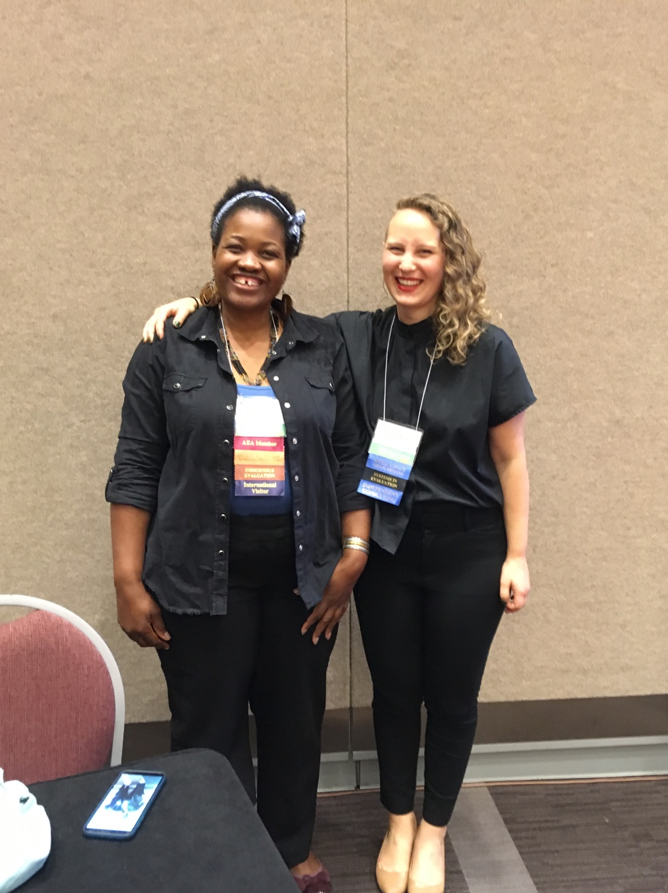Hi, we are Courtney Bolinson (Independent Evaluator) and Tiroyaone Kebalepile (PhD student at the University of Botswana). At Evaluation 2019 we co-presented on our work utilizing a Made in Africa evaluation (MAE) approach in Kenya and Botswana, respectively. We feel that in order to decolonize evaluation work in Africa, any evaluations that take place on the continent should follow a Made in Africa evaluation framework.

Hot Tip: Made in Africa evaluation comes from the Indigenous branch of evaluation, and is driven by African Ubuntu philosophy of connectedness and relatedness between everyone and everything. It focuses on decolonization, participatory methods, building partnerships, adaptability, and capacity building.
Gaotlhobogwe et al. (2018) describe a continuum of African evaluation frameworks, from least indigenized evaluation approaches to third space methodologies:
Least indigenous: Western theories drive the evaluation and there is cosmetic indigenizing. Note from Gaotlhobogwe: this approach is not suitable for use in Africa, as it does not adequately involve the community and is exploitative.
Integrative: Western methods/knowledge systems integrated with African ones, African communities play a significant role.
Predominantly indigenous: African indigenous theories drive the evaluation, particularly relational evaluation systems.
Third space: Geocentric approach, based on the contribution of local and cultural applications and adaptations.
Tiroyaone is using MAE to evaluate the Adopt-a-School program in Botswana. Her evaluation questions follow Ubuntu philosophy and are focused on community needs. To ensure the evaluation is culturally responsive, Tiroyaone is using indigenous data collection methods including the bonfire method, Mmogo method (Roos), and Pitso method. Tiroyaone’s evaluation is a good example of a “predominantly indigenous” MAE.
Courtney worked with a local evaluation team in Kenya to develop and implement a transformative and MAE of a social enterprise focused on primary school education. Bagele Chilisa and the African Evaluation Association provided mentorship and support for bringing a MAE lens to the evaluation. A key transformative and MAE aspect of the evaluation included meaningful participation of the evaluation population via local advisory committees from start to finish. Courtney’s evaluation is a good example of an integrative MAE.
Hot Tip: A case study describing the evaluation in detail, from the perspective of the transformative evaluation lens, can be viewed here.
Rad Resources: The following publications describe the philosophical underpinnings of MAE, provide examples, and provide guidance to evaluators interested in implementing MAE.
- Gaotlhobogwe, M., Major, T. E., Koloi-Keaikitse, S., & Chilisa, B. (2018). Conceptualizing evaluation in African contexts. In F. Cram, K. A. Tibbetts, & J. LaFrance (Eds.), Indigenous Evaluation. New Directions for Evaluation, 159, 47–62.
- Chilisa, B. (2015). A Synthesis Paper on the Made in Africa Evaluation Concept.
- Chilisa, B., Thenjiwe, E. M., Gaotlhobogwe, M., & Mokgolodi, H. (2016). Decolonizing and Indigenizing Evaluation Practice in Africa: Toward African Relational Evaluation Approaches. Canadian Journal of Program Evaluation, 30(3), 313-328.
The American Evaluation Association is celebrating International and Cross-Cultural (ICCE) TIG Week with our colleagues in the International and Cross-Cultural Topical Interest Group. The contributions all this week to aea365 come from our ICCE TIG members. Do you have questions, concerns, kudos, or content to extend this aea365 contribution? Please add them in the comments section for this post on the aea365 webpage so that we may enrich our community of practice. Would you like to submit an aea365 Tip? Please send a note of interest to aea365@eval.org. aea365 is sponsored by the American Evaluation Association and provides a Tip-a-Day by and for evaluators.

This excellent work Ms. Kebalepile and Ms Bolinson. I am especially excited because of your linking evaluative approaches to the African context. As part of my studies, I have argued for one examine linkages between the African concept of Ubuntu and the “western” principles of andragogy in in all aspects of teaching and learning. albeit adult learning in higher education.
Quite some interesting approach to evaluation. MAE is innovating approach to an old subject.
I wish to congratulate Tiroyaone Kebalepile and Courtney Bolinson for putting into practice the MAE principles. Their feedback will be valuable in addressing questions of whether the MAE is rhetoric or possibility.